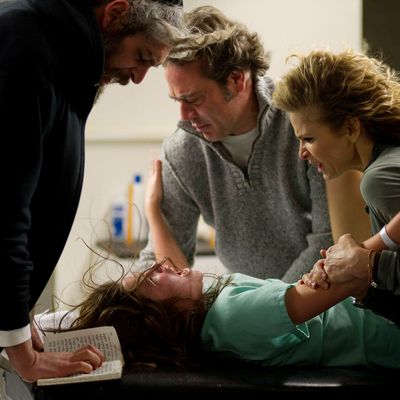
Demon-possession movies are now so ubiquitous that we donÔÇÖt really expect any dramatically new shocks from them. We already know there will be people contorting themselves into weird shapes and previously harmless characters suddenly starting to act oddly insolent, not to mention elaborate, pseudo-biblical mythology and lots of exorcism pyrotechnics. But unlike the slasher flick, which gives us generic characters being killed in more and more elaborate ways, the average possession movieÔÇÖs standard-issue scares ironically give it some room to breathe; it can develop the protagonists so as to make the loss of their souls more palpable.
In Ole BornedalÔÇÖs The Possession, the thrills are as boilerplate as the title: A demonic stare here, a conveniently timed power outage there. But we feel something for the family at the heart of the story, and that makes a big difference. Clyde (Jeffrey Dean Morgan) and Stephanie (Kyra Sedgwick) have divorced recently, and their teenage daughters Em (Natasha Calis) and Hannah (Madison Davenport) appear to be taking it all relatively okay. But Clyde, a basketball coach, has recently bought a home in a new development in some empty stretch of yet-to-be-peopled suburbia, and his empty house stands in sharp contrast to the vibrant home that Stephanie still maintains, with her obligatorily cocky new boyfriend, a dentist (an opportunity the film does relatively little with, believe it or not). Clyde tries to do right by his kids, although his dedication to his college coaching job also means that, like most movie dads, heÔÇÖs missing dance performances and other Important Family Moments left and right. (This is also the reason, weÔÇÖre told, for the divorce.) Still, everybody generally likes each other here, even if they donÔÇÖt always get along; the bitter chill that hangs over most horror films is largely absent. There are no screaming fits, no angry tirades, no slamming doors.
That is, until the demon comes, in the form of a dybbuk (an evil spirit out of Jewish folklore) that is unleashed when Em finds an old box with some Hebrew writing on it at a yard sale, brings it home, and, prompted by the strange voices coming from within, opens it. Pretty soon, she really is screaming at her dad and even stabbing him with a fork. Oh, and giant moths are starting to crawl out of her throat. Poor Clyde, already feeling at siege because he canÔÇÖt provide the warm, attentive environment to his kids that their mom can, begins to realize whatÔÇÖs happening. But itÔÇÖs not like anybodyÔÇÖs going to take him seriously if he says his daughter has been taken by an ancient Hebrew demon. So, he does what any sensible father would do and drives hundreds of miles to New York to find a Jewish exorcist (played by real-life ÔÇ£Hasidic reggae superstarÔÇØ Matisyahu).
Like I said: This is standard stuff, and as The Possession proceeds, it becomes more and more generic. But Bornedal, a Danish director who displayed a knack for atmosphere and performance in previous films like Nightwatch and Just Another Love Story, and screenwriters Juliet Snowden and Stiles White, along with the talented cast, give these characters a genuinely lived-in quality. The family speaks in short, familiar bursts to each other, and you really do get the feeling that youÔÇÖve stepped right into the middle of their lives. ItÔÇÖs not unlike KubrickÔÇÖs The Shining in that sense; there, the tension of the slowly building nightmare was heightened by the humdrum, Midwestern pathos of the Torrance family. ThereÔÇÖs a similar ordinariness to the characters here which serves the film well. ItÔÇÖs a shame, though, that so many of The PossessionÔÇÖs later scenes, particularly the exorcism stuff at the end, is mostly a grab bag of tired old scares. You might have convinced yourself, for a while at least, that this one was going to rise above the crowd.


